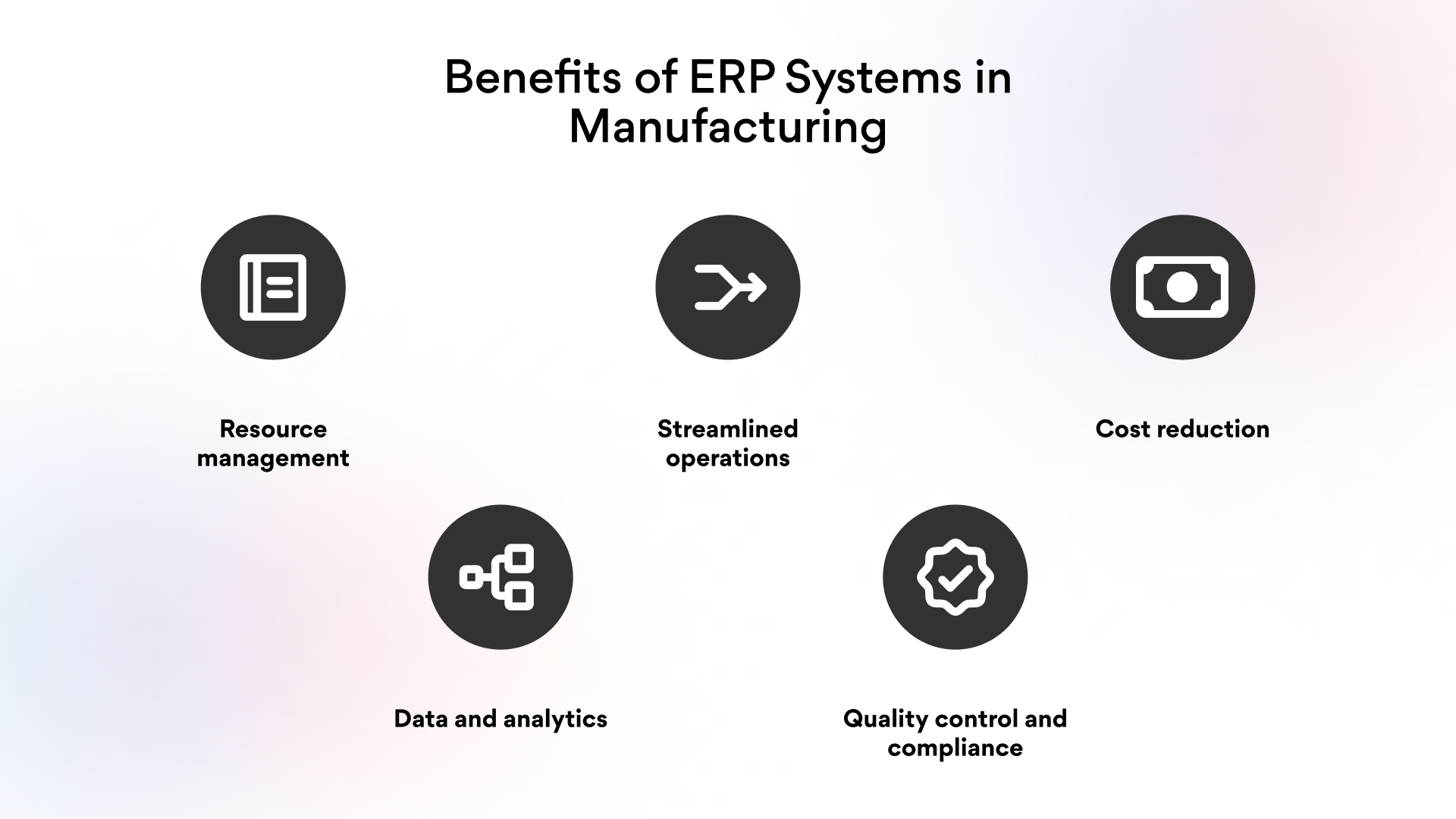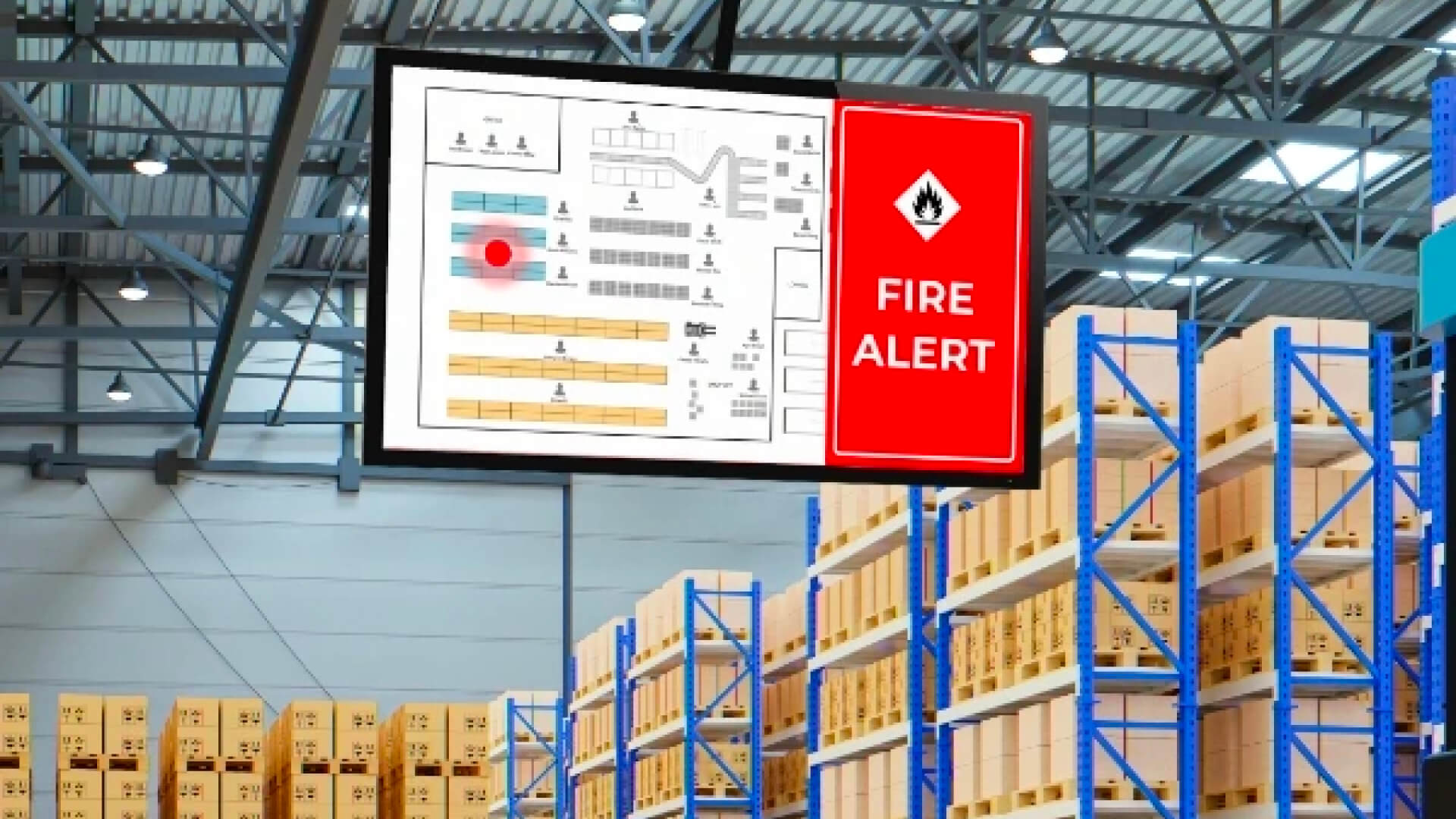
Dec 4 2024
7 min read

All manufacturing businesses will agree on the fact that they will continue earning as long as their machines keep running. However, when the machines stop or face issues in operational efficiency, the cost is significant—it can amount to several hundred thousand dollars per hour for large manufacturing companies.
Jim Davison, region director, South of England at Make UK, states , “One of the biggest challenges manufacturers face is reducing the amount of unplanned downtime.” These operational inefficiencies are difficult to hunt. The only way to address this is by having a strong ERP system. This blog will introduce you to the ERP system and improve your manufacturing processes and management. Let’s start by understanding what an ERP system stands for.

It allows different departments to share information easily and work together, boosting overall efficiency and streamlining decision-making. One of the biggest perks of using ERP is that it gives you access to accurate, real-time data, helping you stay on top of business activities. On top of that, ERP systems come with automated reporting tools that make it easy to create financial reports, track inventory trends, and keep an eye on key performance indicators (KPIs). Many even include advanced analytics to help forecast trends, manage risks, and plan for future growth.

The manufacturing industry includes a bunch of operations and a lot of management tasks. An ERP has numerous beneficial abilities that make these processes less complicated. Here are some of the benefits of the ERP system that make it an unavoidable option for manufacturing companies:
ERP system provides an overview of all the major resources the company owns and manages. Resources, including labor, material, equipment, finance, etc, can be tracked and managed, and the under- or over-utilization of resources can be avoided. As it provides centralized resource information into one system, it is easy to access details about the right workforce for the right tasks, track working hours, manage payroll, track raw materials and finished goods, etc.
One of the best parts of ERP systems in manufacturing is that they streamline operations by automating and integrating business processes. All the departments in a manufacturing organization are interdependent, and ERP fulfills the demand for solid coordination to avoid errors and delays or reduce manual efforts. Moreover, it will allow a seamless flow of information across departments and ensure consistency in operation.
ERP systems efficiently manage entire operations, significantly reducing the need for human intervention. This automation enables companies to cut labor costs while improving overall efficiency.
As the software requires less or zero human intervention, it improves efficiency, minimizes error, and optimizes resource utilization, which ultimately reduces both operational and capital costs. And the best part is that this will lead to better profit margins for the company.
Companies can access the real-time reports on their dashboard generated by ERP solutions whenever they need them. On top of that, ERP allows the manufacturer to track the KPIs to identify areas of improvement and measure the success through these metrics. From their manufacturing KPI dashboard, manufacturers can analyze historical data to forecast future demand and identify trends, which leads to better strategic planning.
Many manufacturers install an ERP system due to its powerful ability to manage risk and safeguard a company’s regulatory compliance. ERP systems can detect and resolve issues earlier to eliminate defects and non-compliance risks. Many industries have strict regulatory policies; ERP can keep up with quality checks, detect supplier certifications, and meet other regulatory requirements.
Check out: Pickcel's digital signage for manufacturing to engage workers and boost operational efficiency
Here is the list of criteria and features an ERP system should have for manufacturers to consider. All these features ensure that the system will best fit their operational needs, improve efficiency, and scale as the business grows.
Companies move to an ERP system to make the operation easier; consecutively, the ERP system should have user-friendly interfaces and intuitive navigation. Moreover, the system must allow the control of different roles within the organization. It will enhance user adoption and ensure the most relevant information for their specific task is available right before them.
Your manufacturing unit requires ERP with certain crucial features to make it a perfect fit for the process. For instance, automation. It should be the core of an ERP system that will integrate with other sectors of the company, automate actions, trigger alerts, and coordinate smoothly. Additionally, features such as advanced data analytics and reporting are mandatory elements in an ERP. Visualization options that can generate meaningful reports, graphs, and charts are also essential.
A feature-rich ERP includes Material Requirements Planning (MRP), Bill of Materials (BOM), and Shop Floor Management. It will streamline tasks like inventory assessment, listing required materials, components, subassemblies, and tracking production, labor resources, etc.
A cloud-based ERP is hosted on external servers using the internet, which makes it flexible, affordable, and something that can be remotely accessed. However, if your primary concern is security rather than budget, an on-premise digital signage ERP system may be your better choice. Big manufacturers who want a system that matches their strict data security requirements and allows greater control over the data usually prefer on-premise ERP solutions.
A strong vendor is essential to ensure quick resolution of technical issues associated with the ERP system. The vendor must have a good reputation for customer support and be available for 24/7 assistance. Implementing ERP into your system can be a daunting task. Therefore, choose a vendor who will provide implementation support, along with a user manual, tutorial videos, and a training program to ensure smooth operation.
Even if you are going with a cloud-based solution, the ERP system must ensure strong data security. It must have all the required security certifications and meet industry-specific regulations. Check if the software matches ISO standards, SOC 2, FDA regulations (for manufacturers in pharmaceuticals or food), GDPR (for manufacturers handling customer data), etc.
Manufacturing businesses differ and have unique workflows that require specific customizations. The ERP must be flexible enough to allow custom workflow and modify reports and dashboards. A flexible system will ensure the manufacturer has control over the dashboard, user role assigning, and various functionalities.
The majority of tasks of an ERP depend upon integration as it connects different manufacturing unit sectors in one place. Additionally, API and third-party integration ensure that operation and production management are smoothly coordinated. In order to have that integrity among the internal processes of the manufacturing businesses, the ERP must be able to integrate with CRM, supply chain management, or MES (Manufacturing Execution Systems). Moreover, the integration should ensure real-time data sync across departments without any manual updates.

Enhance communication: With Pickcel, important push alerts and notifications from ERP can be shared with the relevant departments. For instance, if there is a delay in the supply chain due to a critical maintenance issue, digital signage can instantly display the alert to the stakeholders and highlight the affected area for quick action.
Control the visual display: Pickcel provides businesses with complete control over their unlimited display installations across their facilities. It is easy to create zones and display more than one data or metric simultaneously in real-time. With access to over 100+ digital signage templates and seamless app integration, Pickcel makes the information on digital signage digestible, user-friendly, and interactive. The user will have complete control over the display with limitless possibilities for customization.
Check out: Pickcel's quickplay feature for issuing emergency alerts on your digital signage screens
You have now understood that an ERP system will not only help you make the manufacturing process simpler but also save you from heavy financial losses. Installing an ERP is the smart way to manage a business; at the same time, digital signage software like Pickcel keeps the entire team and the employer updated and informed.





Dec 4 2024
7 min read

Nov 20 2024
8 min read

Nov 8 2024
7 min read

Nov 5 2024
8 min read
Take complete control of what you show on your digital signage & how you show it.
Start Free Trial Schedule My Demo